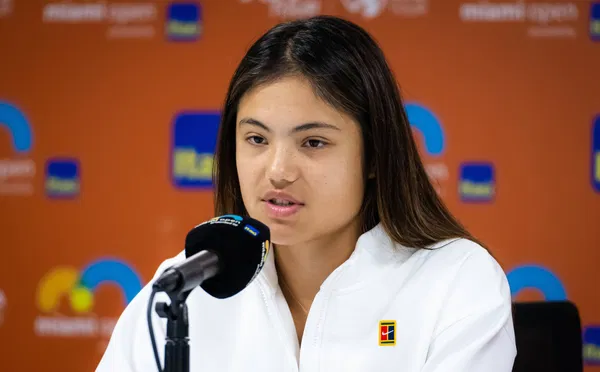
Emma Raducanu faces significant challenges ahead of the Australian Open, as the British tennis star finds herself in a precarious situation. Recently, she withdrew from the ASB Classic, citing a “back niggle” just before the tournament began. The withdrawal disappointed fans, as the event could have provided a valuable warm-up for her first Grand Slam of the season. However, her back issue is not the only concern as she prepares for fierce competition.
In an unusual turn of events, Raducanu is also dealing with the aftermath of an insect bite. While in Australia, she suffered a swollen hand after being bitten by jumping ants. According to a tweet from Eurosport, Raducanu refused antiseptic treatment for fear it might lead to a positive doping test. This decision highlights the increasing caution athletes exercise in the wake of high-profile anti-doping cases involving top players like Jannik Sinner and Iga Swiatek.
Emma Raducanu’s hand swelled up after being bitten by jumping ants in Australia but she has refused antiseptic treatment in case contamination led to a positive doping test 🐜🇦🇺#AusOpen pic.twitter.com/upTHENjHpQ
— Eurosport (@eurosport) January 10, 2025
Last year, both Sinner and Swiatek faced scrutiny after testing positive for banned substances. Swiatek served a one-month ban, while Sinner’s case involved the prohibited substance clostebol, which he reportedly contracted through a massage by a former physiotherapist. Although the International Tennis Integrity Agency (ITIA) cleared Sinner of any fault or negligence, the World Anti-Doping Agency (WADA) has appealed to the Court of Arbitration for Sport (CAS) for further review. This ongoing controversy has led to widespread criticism and added pressure on players like Raducanu.
Speaking at a pre-tournament press conference, Raducanu revealed her reasoning for refusing treatment despite the discomfort. She explained that she was offered a natural antiseptic spray to alleviate the swelling but declined it to avoid the risk of using a banned substance. “I didn’t want to risk it,” she said, describing how she endured the swelling in her ankle and hand. “I’m just going to tough it out because I don’t want to risk it.”
Raducanu emphasized that this careful approach reflects a broader concern among players. “It’s obviously a concern on our mind. We’re all in the same boat. It’s just how we manage as best as we can the controllables,” she stated. However, her cautious attitude may further fuel criticism from fans who have already noted the frequency of her withdrawals. Last year, Raducanu competed in only 14 tournaments, drawing attention to her limited participation.
The news about Raducanu’s decision sparked mixed reactions from fans. Some criticized her, with one fan posting a disapproving meme accompanied by the comment, “What the h***, sure.” Another expressed disbelief over the situation, highlighting the pressure athletes face and remarking, “The way they stress the athletes is getting out of control.” Many sympathized with her predicament, acknowledging that recent doping controversies have made players reluctant to seek necessary medical treatment.
Raducanu has previously spoken about the challenges of navigating strict anti-doping regulations. During her preseason training in London last year, she admitted to avoiding certain over-the-counter supplements because they were not batch-tested. This cautious mindset reflects how much doping cases have influenced her approach to health and competition.
As Raducanu prepares for her opening match against Ekaterina Alexandrova, her fitness remains uncertain. Fans are eager to see if she can overcome these hurdles and contend for her first Australian Open title. The situation underscores the growing complexity athletes face as they balance their health, performance, and the potential ramifications of doping controversies.